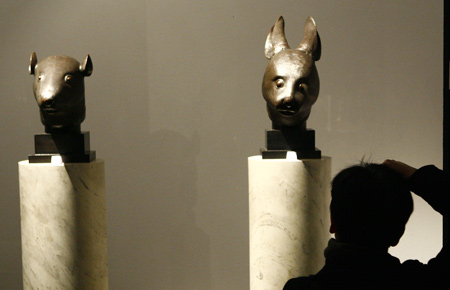Mobile
Relic hunters descend on US, European museums
2009-Oct-19 09:44:14
China will send an expert team to trace and document relics taken from the Old Summer Palace that are now in foreign countries, a park official said Sunday.
|
 A photographer takes a picture of the Chinese bronze rat head and rabbit head sculptures displayed at the preview of the auction of Yves Saint Laurent and Pierre Berge's art collection at the Grand Palais in Paris, France, February 21, 2009. China will send an expert team to trace and document relics taken from the Old Summer Palace that are now in foreign countries.[Xinhua]
A photographer takes a picture of the Chinese bronze rat head and rabbit head sculptures displayed at the preview of the auction of Yves Saint Laurent and Pierre Berge's art collection at the Grand Palais in Paris, France, February 21, 2009. China will send an expert team to trace and document relics taken from the Old Summer Palace that are now in foreign countries.[Xinhua] |
The team of experts will visit museums, libraries and private collectors next year in the United States, the United Kingdom, France, Japan and other countries for photos, documents and archives of relics plundered from the Old Summer Palace, according to Chen Mingjie, director of the park's management office.
"We hope to build a complete database of the Old Summer Palace's lost relics so we can have a clearer view of the historical royal garden, then known as the 'Garden of Gardens' before it was looted and burned down in 1860 by invading British and French armies," said Chen.
"We don't really know how many relics have been plundered since the catalogue of treasures stored in the garden was burned during the catastrophe. But based on our rough calculations, about 1.5 million relics are housed in more than 2,000 museums in 47 countries."
Some of them are being showcased in the British Museum and the Fontainebleau Art Museum in France, Chen added.
The expert team has contacted several museums and libraries so far without encountering resistance, according to Chen.
"We have clarified that this is an attempt to document rather than to seek a return of those relics," said Chen, "even though we do hope some previously unknown relics might surface and some might be returned to our country during our tracing effort."
A camera crew from China Central Television will follow and document the team's effort to keep the domestic audience posted about their progress, but possibilities exist that video or photography might not be allowed.
"We will get as much as we can," said Chen.
Like other ancient civilizations, China saw many cultural relics taken overseas when the country was subjected to wars and occupation.
According to the Chinese Cultural Relics Association, more than 10 million Chinese cultural relics were taken from the country between 1840 and 1949, a large number of which are now stored at major public museums in Europe and the US.
China has been actively seeking the return of overseas relics during the past decade through purchases at international auctions, donations by private collectors or overseas Chinese and increasingly through diplomatic means based on international conventions.
Last February, two looted fountainheads from the Old Summer Palace were sold at auction giant Christie's for 14 million euros ($17.9 million), which roused opposition from the Chinese and international communities.
[Jump to ]
Nation | Biz | Comment | World | Celebrity | Odds | Sports | Travel | Health
m.chinadaily.com.cn
To subscribe to China Daily, call 010-64918763 or email to circu@chinadaily.com.cn
